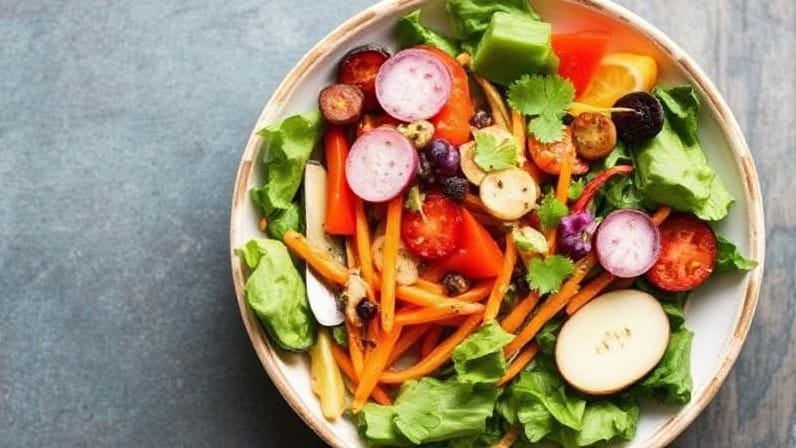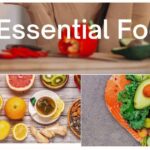“Beat bloat and feel revitalized! Get your free 21-Day Anti-Inflammatory Diet and start transforming your health today.”
21-Day Anti-Inflammatory Diet
Inflammation is your body’s natural reaction to injury and infection. Chronic inflammation, however, can contribute to health problems like bloating, fatigue, and a greater risk of chronic diseases. An anti-inflammatory diet is one in which the goal is to eat foods that help reduce inflammation, as well as avoid foods that promote inflammation. This 21-day plan is designed to assist you in developing new eating habits that can help you feel more energetic and less bloated.
Understanding Inflammation and Its Impact
What is Inflammation?
Inflammation is the way your immune system reacts to harmful stimuli. Acute inflammation is protective in nature, while chronic inflammation can be harmful as it can damage healthy cells and tissues, which can contribute to an array of health issues, including:
- Digestive conditions like bloating and gas
- Fatigue and low energy
- Joint pain and stiffness
- A greater risk of developing chronic diseases such as heart disease and diabetes
- What Contributes to Chronic Inflammation?
- There are many factors to consider that contribute to chronic inflammation, including:
- A diet consisting of poor quality, highly processed foods, and high in sugar
- Inactivity
- Chronic stress
- Exposure to environmental toxins
- Poor quality of sleep
Benefits of an Anti-Inflammatory Diet
- Anti-inflammatory diets can provide a plethora of advantages to one’s health, including:
- Less Bloat – By consuming whole, minimally processed foods, digestion can be improved, therefore potentially limiting gas and bloating.
- More Energy – Consuming foods that are nutrient-dense may provide longer-lasting energy levels throughout the day.
- Healthy Weight – A balanced diet can give us the best chance of maintaining a healthy weight.
- Happy mood – Some anti-inflammatory foods may have a positive effect on our brain health and mood.
- Lower risk of disease – By lowering inflammation levels, we can lower the risk of chronic health conditions.
Core Principles of the 21-Day Anti-Inflammatory Diet
Foods to eat
- Fruits and vegetables – Lots of antioxidants and fiber. Try to eat colorful fruits and vegetables.
- Whole grains – Brown rice, quinoa, oats, barley.
- Lean proteins – Fish, poultry, tofu, and legumes.
- Healthy fats – Olive oils, avocados, nuts, and seeds.
- Herbs and spices – Turmeric, ginger, garlic, and cinnamon have anti-inflammatory properties.
Foods to Limit
- Processed foods – Often high in trans-fats and other additives.
- Refined sugars and carbohydrates – Cookies, muffins, soft drinks, white breads.
- Red and processed meats – Linked to increased inflammation.
- Excessive alcohol may harm gut health and increase inflammation.
21-Day Meal Plan Overview
This meal plan is provided as a template in order to provide balanced nutrition while lowering inflammation. Each day’s meals are breakfast, lunch, dinner, and snacks.
Week 1: Detox and Reset

Day 1:
- Breakfast: Oatmeal with berries and chia seeds.
- Lunch: Quinoa salad with mixed veggies and lemon vinaigrette.
- Dinner: Grilled salmon with steamed broccoli and sweet potatoes.
- Snack: Carrot sticks with hummus.
Day 2:
- Breakfast: Smoothie with spinach, banana, and almond milk.
- Lunch: Lentil soup with whole grain bread.
- Dinner: Tofu stir-fry with mixed veggies and brown rice.
- Snack: Apple slices with almond butter.
- To continue the detox, do a similar pattern of eating with a focus on whole foods and variety.
Week 2: Rebuild and Strengthen

In the second week, add diversity of recipes and focus on gut health.
Day 8:
- Breakfast: Greek yogurt with flax seeds and blueberries.
- Lunch: Chickpea salad with cucumbers, tomatoes, and olive oil.
- Dinner: Baked chicken breast with quinoa and baked Brussels sprouts.
- Snack: a handful of walnuts.
- Be sure to include fermented foods like kimchi or sauerkraut for gut health.
Week 3: Sustain and Energize

In the final week of the challenge, we will focus mostly on maintaining steadiness in our level of energy as well as preventing inflammation.
Week 3 will be all about maintaining energy levels and preventing inflammation.
Day 15:
- Breakfast: Avocado toast made with whole grain bread, topped with one poached egg.
- Lunch: Turkey and spinach wrap with hummus.
- Dinner: Grilled shrimp on zucchini noodles with pesto.
- Snack: A cup of mixed berries.
- Prior we will try to mix in variety in order to avoid repetitiveness in our meals as well as breaking our monotony and ensuring we get nutrients from variety.
Tips for Success
- Meal preparation: Be ahead of the game and take the time to plan and prepare, and stick with it!
- Stay hydrated: Make sure to drink lots of water during the day.
- Mindful Eating: Be aware of the food you’re eating, eat slower, and listen to your internal hunger cues.
- Daily exercise: Make sure to include regular physical activity to get the most out of your program.
- Sleep: Aim for 7 to 9 hours of good quality sleep each night.
Simple Recipe:
- 1 cup spinach
- 1 banana
- 1/2 cup frozen mixed berries
- 1 tablespoon chia seeds
- 1 cup almond milk
Instructions:
Add all ingredients to the blender and blend until smooth. This makes a nutritious breakfast or snack!
Quinoa and Vegetable Stir-Fry
Ingredients
- 1 cup cooked quinoa
- 1 cup vegetables (mixed: broccoli, bell peppers, carrots)
- 1 tablespoon olive oil
- 1 clove garlic minced
- 1 tablespoon low-sodium soy sauce
Instructions:
Add garlic to olive oil in the skillet and sauté until fragrant; add vegetables and cook until tender; add quinoa and heat through, and then add soy sauce and cook 2-3 more minutes.
Tracking and Reporting Changes
- Keep a journal to track/review:
- Meals and snacks
- Energy levels
- Digestion
- Mood
- Activity
Looking back on your journal regularly can help give you an overall picture of your patterns and progress and show where you need to improve or change things.
Starting a 21-day anti-inflammatory nutrition program can have a positive effect on your health overall by reducing bloating, increasing energy, and reducing the risk of chronic disease. By focusing on whole, nutrient-rich foods and eliminating inflammatory triggers, you are creating a road map for your healthy eating journey!
FAQs
1. What exactly is the anti-inflammatory diet?
The anti-inflammatory diet is a diet-based approach that prioritizes eating whole and unprocessed foods to reduce chronic inflammation. This would include food groups like fruits, vegetables, lean proteins, whole grains, and healthy fats while avoiding as many foods as possible that are processed, added sugar, and trans fats.
2. How does this diet help with bloating and energy levels?
This diet removes many common bloating triggers like processed foods, dairy, and sugar, and replaces those foods with fiber-rich, gut-friendly foods. These changes contribute to improved digestion and nutrient absorption, which ultimately reduce bloating and increase energy for everyday tasks.
3. Is the 21-day plan suitable for beginners?
Yes! The 21-day plan is designed for everyone, from beginners to expert healthy eaters. The plan includes easy recipes, meal prep tips, and a gradual process to transition into anti-inflammatory eating to avoid becoming overwhelmed!
4. Will I lose weight on the plan?
Many people lose weight on an anti-inflammatory diet because they are generally consuming fewer inflammatory, calorie-dense foods, as well as retaining less water and digesting better. To be clear: while weight loss can be a side effect of an anti-inflammatory diet, improving health is the main goal of this program.
5. Are there any side effects to an anti-inflammatory diet?
Some people experience mild detox symptoms in the first few days, like headaches or light-headedness, as their bodies make adaptations; staying hydrated and getting rest may help alleviate those symptoms.















